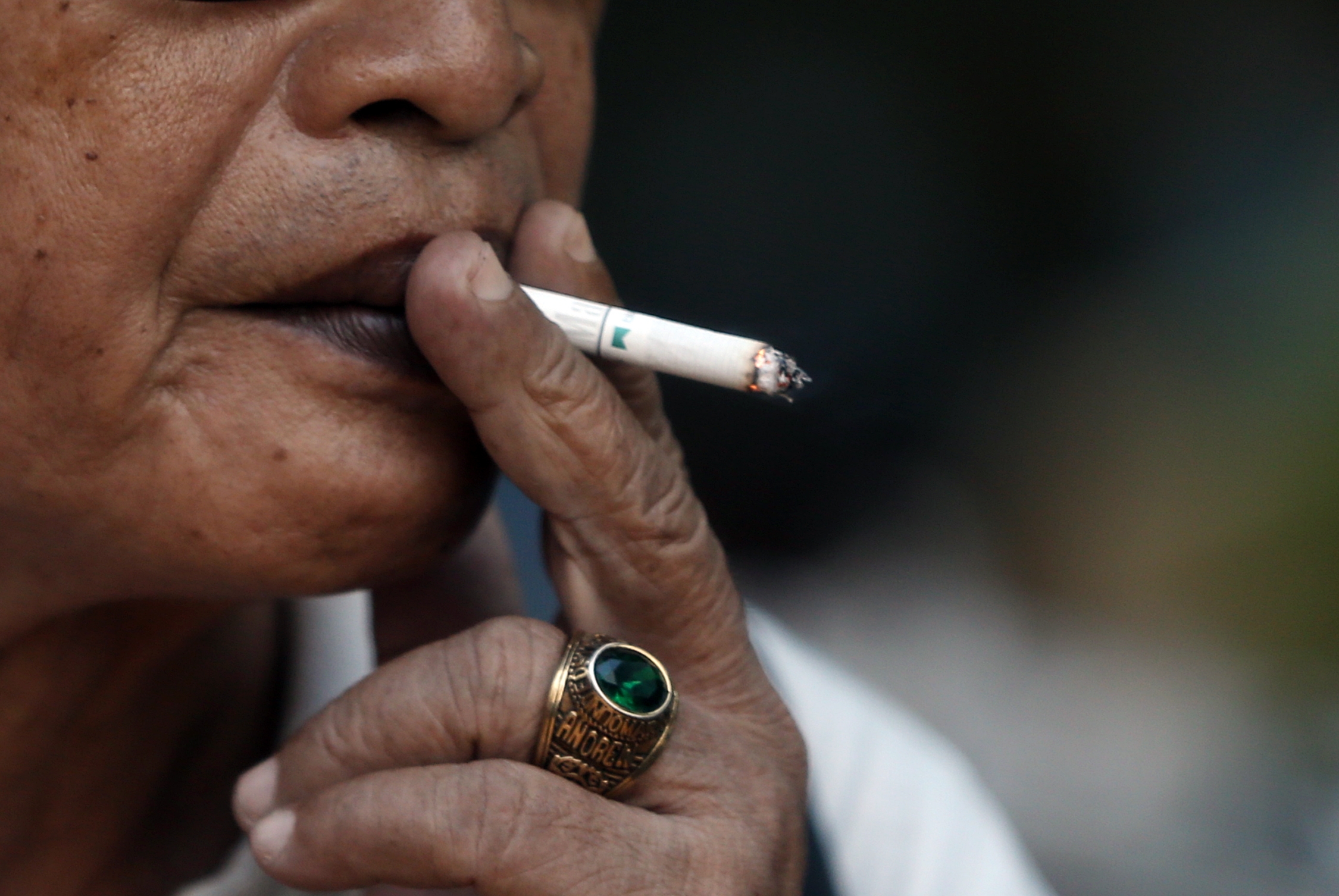Higher tax on tobacco? Smokers seem undaunted

Credit to Author: clopez| Date: Wed, 05 Jun 2019 21:40:13 +0000
MANILA, Philippines — Pedicab driver Rodolfo Valdes says it will be hard for him to quit smoking even if the government imposes a higher tax on cigarettes over the next few years.
His reason: Smoking at least 10 cigarettes a day has been part of his life over the past 45 years.
The 60-year-old Valdes acknowledges though that he may cut down on his consumption by at most two sticks a day with the expected P10 tax hike per pack of cigarettes next year.
On Wednesday, the House of Representatives and the Senate finally approved the bill raising the excise on cigarettes to P45 on Jan. 1, 2020. The bill awaits President Duterte’s signature to become a law.
The tax will be increased by P5 yearly until it reaches P60 per pack in 2023. Thereafter, a 5-percent annual increase will be implemented.
The government is expected to collect P15 billion in the first year alone from the tax measure. It plans to use half of the revenues from the higher excise on tobacco products to fund the universal health care program.
Stress reliever
Like Valdes, architect Joyce says the tax increase will not affect her smoking habit, especially that this is a way for her “to relieve stress.”
For events host Rommel, smoking is one of the things that he and his friends do when they socialize.
Ulysses Dorotheo, executive director of Southeast Asia Tobacco Control Alliance (Seatca), is resigned to the fact that even if the price of cigarettes goes up, there will still be holdouts.
He points out that while Seatca appreciates the revenue that smokers help generate through the tax they pay, it is still hopeful that smokers will kick the habit.
“We want them to stop. It’s not impossible. Every smoker has the capacity to stop smoking,” Dorotheo told reporters on Tuesday.
Some 17 million Filipinos smoke at least 10 cigarettes daily.
Vapes
The National Sin Tax Coalition, to which Seatca belongs, is concerned that while some may give up cigarettes, others may “downshift” to using electronic cigarettes or vapes given the low tax imposed on these devices.
A last-minute amendment to the Senate version that the House adopted imposed a P10 tax per 10 milliliters of substance used in e-cigarettes.
“What is P10? It doesn’t make much of a difference. If the purpose is to discourage, it doesn’t have any effect,” Dorotheo said.
In the next few days, the Department of Health (DOH) is expected to issue an administrative order regulating the sale of e-cigarettes in the country.
This doesn’t mean that the DOH is promoting its use, especially among those who want to quit smoking, according to Health Secretary Francisco Duque III.
“It doesn’t necessarily follow that this is a good alternative to smoking. But the reality is, it’s already widespread. We better regulate it and let it go through our stringent regulatory standards,” Duque said on Monday.
The World Health Organization (WHO) said that it was supporting the DOH move to regulate the industry especially as it remained “critical” of the claim that e-cigarettes helped users quit smoking.
“We see that in a number of countries e-cigarettes are being pushed among young people. These are not harmless products. We don’t fully know yet its long-term effects but certainly they are not neutral to health,” said WHO representative to the Philippines Gundo Weiler.
He noted that the push for e-cigarette use was supported by the tobacco industry “to build up a pool of young people who are nicotine-dependent.”
Juul launching
The DOH issuance of an administrative order incidentally comes as one of the largest e-cigarette companies, Juul, is expected to launch its products in the country on June 20.
Juul’s parent company is tobacco giant Altria, which owns Philip Morris.
Duque warned the public on Wednesday against the use of e-cigarettes, saying there is still not enough proof that these devices are harmless to one’s health.
Following Congress’ passage of the higher tobacco tax rates, the e-cigarette industry has been increasingly pushing its claims that its products are healthier alternatives to smoking, he said.
Not harmless
He said the public should not be deceived by such claims since “there are no sound evidence” that support them.
“I’m aware of the claims that e-cigarettes contain fewer toxic chemicals and are therefore good alternatives to smoking. There are no scientific proof yet that can say e-cigarettes are completely harmless,” he said.
Duque vowed that in the 18th Congress the DOH would lobby to set a higher tax for other sin products, including e-cigarettes.
“We must remember that the harmful use of these products can also affect a community. Secondhand smoking affects nonsmokers or excessive use of alcohol can lead to road [crashes]. The DOH will continue to work toward progressive policies that uphold the health and well-being of the Filipino people,” he said.